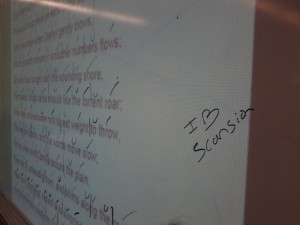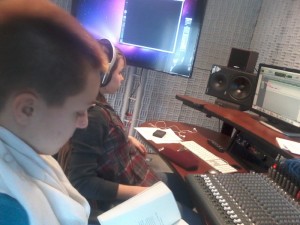In fall of 2012, I experimented with my standard American poetry class, adding a component in which students would learn to do formal analysis of poetry primarily though performing poetry out loud. For about half of the semester we recited poems, memorized sonnets, and learned to offer suggestions for delivery to each other. By the end of the semester, the class had recorded all the main poems in Herman Melville’s collection of Civil War poems entitled Battle-Pieces.
The structure worked well enough that I subsequently developed a course entitled “Voicing the Verse: Poetry in Performance.” This class fulfills not only the poetry requirement for English majors and minors but also the “Aesthetic Perspective,” a core distribution requirement in Clark’s Program in Liberal Studies. In addition to regular class time, weekly studio sessions introduce students to rehearsal and performance processes in small groups. These rehearsal sessions lead not only to better performance of poems but to more productive means of critiquing both formal and artistic aspects of those performances.
The studio sessions also helped to enliven the rather technical material in the first half of the semester — metrical scansion and other formal analysis of aural effects in poetry. The rehearsal process in particular helps students to bridge the gap between theory and practice, analysis and experience. Scansion is often the toughest component of a traditional poetry class, but by linking the technical skills to oral interpretation, I find that students have a distinct advantage when it comes to metrical analysis.This week, with our prosody midterm behind us, we went into the recording studio for the first time. This year we are trying a partnership with Professor Matt Malsky‘s “Recording Practice and Audio Art” course. Students from the Music class take turns working as engineers for individual recording sessions with the Poetry student and afterward work to perfect the recording tracks in post production.
This spring’s poetry class is taking on the supplementary verse at the end of Battle-Pieces in order to finish up our long, first LibriVox project. Though fans of poets as disparate as Gerard Manley Hopkins, William Blake, and Mickle Maher (we read Maher’s verse play There Is a Happiness That Morning Is as part of our study of rhyming), the students took to Melville very quickly, immediately capturing the introspective mourning of his “Verses Inscriptive and Memorial.” The audio files won’t be ready for sampling for a little while, so in the meantime, enjoy reading a few selections from our first recording sessions below. In the meantime, we’ll keep working on how to approach the longest poem in the collection: the 114-stanza narrative poem “The Scout toward Aldie.” Wish us luck!
On the Men of Maine
killed in the Victory of Baton Rouge, Louisiana
Afar they fell. It was the zone
. Of fig and orange, cane and lime
(A land how all unlike their own,
With the cold pine-grove overgrown),
. But still their Country’s clime.
And there in youth they died for her–
. The Volunteers,
For her went up their dying prayers:
. So vast the Nation, yet so strong the tie.
What doubt shall come, then, to deter
. The Republic’s earnest faith and courage high.
Commemorative Of A Naval Victory
Sailors there are of the gentlest breed,
. Yet strong, like every goodly thing;
The discipline of arms refines,
. And the wave gives tempering.
. The damasked blade its beam can fling;
It lends the last grave grace:
The hawk, the hound, and sworded nobleman
. In Titian’s picture for a king,
Are of hunter or warrior race.
In social halls a favored guest
. In years that follow victory won,
How sweet to feel your festal fame
. In woman’s glance instinctive thrown:
. Repose is yours–your deed is known,
It musks the amber wine;
It lives, and sheds a light from storied days
. Rich as October sunsets brown,
Which make the barren place to shine.
But seldom the laurel wreath is seen
. Unmixed with pensive pansies dark;
There’s a light and a shadow on every man
. Who at last attains his lifted mark–
. Nursing through night the ethereal spark.
Elate he never can be;
He feels that spirit which glad had hailed his worth,
. Sleep in oblivion.–The shark
Glides white through the phosphorus sea.



